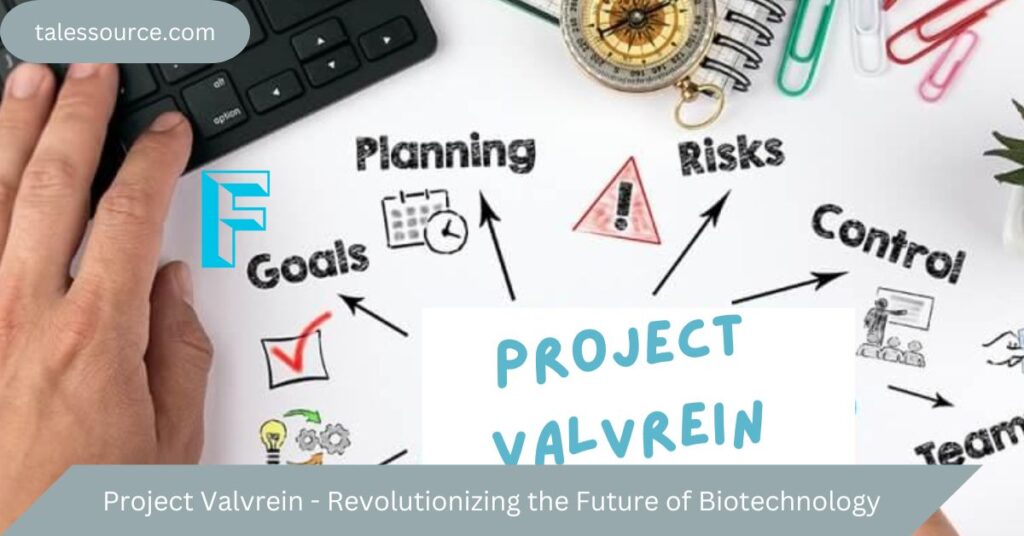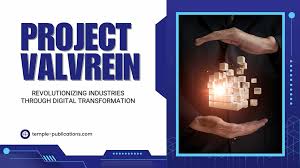Project Valvrein – Revolutionizing the Future of Biotechnology

Introduction to Project Valvrein
Project Valvrein is an ambitious and innovative biotechnology initiative that promises to transform multiple industries through groundbreaking scientific discoveries. At the heart of this project lies cutting-edge research aimed at revolutionizing how we approach healthcare, disease management, and bioengineering. As the world eagerly watches its progress, Project Valvrein stands as a beacon of hope for scientists, healthcare professionals, and innovators seeking to unlock new potentials in human and technological synergy.
The project’s visionary approach is poised to not only redefine existing paradigms but also chart new paths in the fields of genomics, regenerative medicine, and bio-computing. With its wide-ranging applications and promise to alter the fabric of biotechnology, the buzz surrounding Project Valvrein continues to grow.
In this detailed article, we’ll explore the key aspects of Project Valvrein, its technological advancements, and potential impact on various industries. We’ll also delve into the critical insights, analyses, and trends that could make Project Valvrein the next big thing in biotech.
The Vision Behind Project Valvrein
Pioneering Biotechnology for Global Impact
The primary vision of Project Valvrein is to spearhead advancements in biotechnology that can have far-reaching global impacts. Through meticulous research and development, the project aims to:
- Transform medical treatments through personalized and precision medicine.
- Advance genetic engineering to combat previously untreatable diseases.
- Improve healthcare accessibility through scalable biotechnological solutions.
- Create regenerative therapies that can repair and replace damaged tissues and organs.
Addressing Global Healthcare Challenges
The global healthcare sector faces an array of challenges, from the rising prevalence of chronic diseases to limited access to affordable treatments in underdeveloped regions. Project Valvrein aims to bridge these gaps by fostering an ecosystem where advanced biotechnology is accessible, scalable, and sustainable.
By focusing on these key areas, Project Valvrein seeks to provide practical, long-term solutions to modern healthcare dilemmas:
- Chronic Disease Management: Utilizing genetic modification and bioengineering to target diseases at a molecular level.
- Affordable Therapies: Reducing the cost of sophisticated treatments by streamlining biotechnology processes.
- Healthcare Accessibility: Ensuring that breakthrough treatments reach populations in need through global partnerships and collaboration.
Read More: David Bromstad Twin Brother – Unveiling the Truth Behind the Mystery
Core Technologies of Project Valvrein
1. Genomics and Precision Medicine
Genomics plays a central role in Project Valvrein’s mission, with scientists developing techniques that allow for the precise editing and manipulation of DNA. This could lead to revolutionary new treatments for genetic diseases like cystic fibrosis, muscular dystrophy, and even cancer.
The integration of precision medicine allows treatments to be tailored to individuals based on their genetic makeup. This personalized approach could drastically improve the efficacy of treatments, reducing side effects and increasing survival rates.
- CRISPR-Cas9 Technology for precise genome editing.
- Gene Therapy applications to cure hereditary conditions.
- Biomarker Identification to enhance personalized treatment plans.
2. Synthetic Biology
Synthetic biology combines biology with engineering principles to create new biological systems or redesign existing ones for practical applications. Project Valvrein is at the forefront of this field, working on developing synthetic organisms that could revolutionize industries such as agriculture, pharmaceuticals, and biofuels.
- Biofuels: Engineered organisms that can produce sustainable energy sources.
- Pharmaceuticals: New drugs and vaccines synthesized using engineered microbes.
- Agriculture: Genetically modified crops that are more resistant to pests, diseases, and changing climate conditions.
3. Regenerative Medicine

Regenerative medicine is one of the most promising fields within Project Valvrein. The aim is to harness the body’s own healing mechanisms to restore damaged tissues or organs. This could eventually lead to solutions for conditions such as spinal cord injuries, Parkinson’s disease, and heart disease.
- Stem Cell Therapy to repair damaged tissues.
- 3D Bioprinting to create artificial organs for transplantation.
- Tissue Engineering for reconstructive surgeries and organ regeneration.
4. Bioinformatics and AI Integration
As the complexity of biological data continues to grow, Project Valvrein utilizes bioinformatics and artificial intelligence (AI) to analyze, model, and predict outcomes. AI plays a pivotal role in identifying patterns in large datasets, optimizing experimental designs, and predicting the efficacy of treatments.
- Drug Discovery: Accelerating the identification of viable drug candidates.
- Data Analysis: Processing genomic and proteomic data to develop precise treatment protocols.
- Predictive Modeling: Using machine learning algorithms to simulate disease progression and treatment outcomes.
Potential Impact of Project Valvrein Across Industries
Healthcare and Medicine
The healthcare industry stands to benefit immensely from the innovations stemming from Project Valvrein. From the development of new drugs to the prevention of genetic disorders, this project could usher in a new era of healthcare.
- Targeted Cancer Treatments: Using gene editing to develop drugs that attack cancer cells without harming healthy tissue.
- Infectious Disease Control: Developing rapid-response vaccines for emerging pathogens through synthetic biology.
- Regenerative Therapies: Repairing organs damaged by chronic diseases or injury with lab-grown tissues and cells.
Pharmaceuticals
Pharmaceutical companies are increasingly looking to biotechnology to develop novel drugs and therapies. Project Valvrein could lead to breakthroughs in areas like antibiotic resistance, where traditional drug discovery methods have failed.
- Antibiotic Alternatives: Leveraging synthetic biology to produce bacteria-fighting enzymes.
- Personalized Medication: Developing drug regimens tailored to an individual’s genetic profile.
- Faster Drug Development: Using AI to simulate drug interactions and potential side effects, reducing the time required for clinical trials.
Agriculture and Food Production
The impact of Project Valvrein on agriculture could be profound. Genetically engineered crops and livestock could help address food security challenges in a rapidly growing world population.
- Disease-Resistant Crops: Using genetic modification to create crops that can thrive in challenging climates.
- Sustainable Farming: Employing synthetic organisms to enhance soil health and crop yields.
- Lab-Grown Meat: Developing alternative protein sources through bioengineering to reduce the environmental impact of traditional livestock farming.
Read More: Josh Brolin Net Worth – An In-Depth Analysis
Ethical Considerations and Challenges
Ethical Dilemmas in Genetic Engineering
As with any emerging technology, Project Valvrein raises important ethical questions, particularly in the areas of genetic engineering and synthetic biology. Some of the concerns include:
- Human Germline Editing: The implications of altering human DNA in ways that could be passed down to future generations.
- Ecological Impact: The potential for synthetic organisms to disrupt natural ecosystems if released into the environment.
- Biosecurity Risks: The possibility of bioterrorism using engineered pathogens.
Regulatory Hurdles
Biotechnology advancements often outpace regulatory frameworks. Ensuring that new treatments and products developed under Project Valvrein are safe, effective, and ethical requires robust international regulations.
Future Prospects of Project Valvrein

Projected Breakthroughs in the Next Decade
The future of Project Valvrein is filled with promise, as researchers predict several key breakthroughs over the next decade. These include:
- Functional Artificial Organs: Using bioprinting technology to create fully functioning organs for transplant.
- Cure for Genetic Disorders: Employing CRISPR technology to eliminate genetic diseases at the embryonic stage.
- AI-Driven Healthcare Solutions: Fully integrating AI into healthcare to provide real-time diagnostics and treatment recommendations.
Global Collaboration and Funding
For Project Valvrein to achieve its full potential, international collaboration and funding will be critical. Governments, private companies, and academic institutions must work together to ensure that the discoveries made are shared and implemented globally.
Conclusion:
Project Valvrein represents the next frontier in biotechnology. With its focus on genomics, regenerative medicine, synthetic biology, and AI, it has the potential to transform not only healthcare but also industries like agriculture, energy, and pharmaceuticals. As the project continues to evolve, it holds the promise of ushering in a new era of scientific discovery and innovation.
By addressing the ethical challenges and securing global collaboration, Project Valvrein could be the key to unlocking a future where diseases are curable, treatments are accessible, and biotechnology becomes a cornerstone of human advancement.
FAQs
1. What is Project Valvrein?
Project Valvrein is a pioneering biotechnology initiative aimed at revolutionizing healthcare, disease management, and bioengineering through cutting-edge research in genomics, synthetic biology, and regenerative medicine.
2. What are the key technologies used in Project Valvrein?
The project focuses on several key technologies, including genomics and precision medicine, synthetic biology, regenerative medicine, and bioinformatics powered by AI.
3. How does Project Valvrein impact healthcare?
It aims to provide personalized medicine, improve chronic disease management, and develop affordable, scalable biotechnological solutions, ultimately transforming global healthcare.
4. What industries could benefit from Project Valvrein?
In addition to healthcare, Project Valvrein’s advancements could benefit pharmaceuticals, agriculture, food production, and energy.
5. What role does AI play in Project Valvrein?
AI is crucial for analyzing complex biological data, accelerating drug discovery, and developing predictive models for disease progression and treatment outcomes.
6. What are the ethical concerns surrounding Project Valvrein?
Key concerns include human germline editing, potential ecological impacts of synthetic organisms, and biosecurity risks.
7. How does Project Valvrein plan to tackle genetic diseases?
Through gene therapy and genome editing techniques like CRISPR, the project aims to treat or even eliminate genetic disorders.
8. What is the potential impact of Project Valvrein on agriculture?
Project Valvrein could revolutionize agriculture by creating disease-resistant crops, enhancing sustainable farming, and developing lab-grown meat alternatives.
9. What challenges does Project Valvrein face?
Challenges include ethical dilemmas, regulatory hurdles, and the need for international collaboration and funding to realize its full potential.
10. What are the long-term goals of Project Valvrein?
The project aims to create functional artificial organs, develop cures for genetic diseases, and fully integrate AI-driven solutions into healthcare over the next decade.
Read More:





